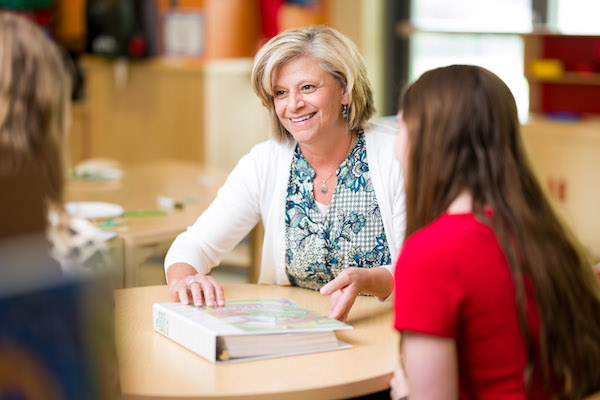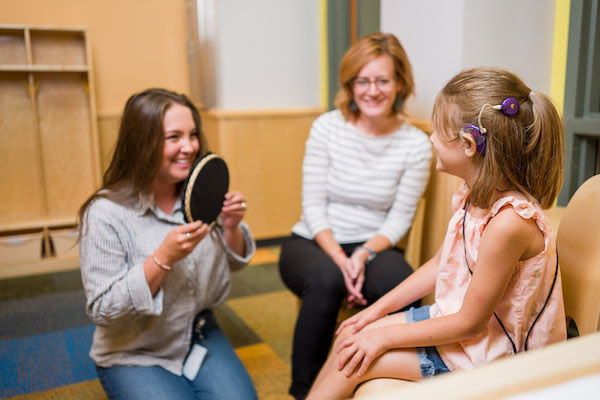Communicative Disorders and Deaf Education Department Receives Two OSEP Grants for Graduate Studies

Dr. Lauri Nelson works with graduate student in the Listening and Spoken Language (LSL) graduate program.
The US is experiencing a critical shortage nationwide for trained and certified professionals in deaf education, speech-language pathology, and pediatric audiology. As part of this training, a two-year graduate program is required for students to practice in the pediatric field with children who are deaf or hard of hearing (D/HH). The Office of Special Education Programs (OSEP) within the US Department of Education has provided an opportunity for universities to apply for funding to be used by students accepted into a special education graduate program. Utah State University applied for two separately funded grant programs within the Emma Eccles Jones College of Education and Human Services under the Communicative Disorders and Deaf Education department.
The Listening and Spoken Language (LSL) Interdisciplinary graduate training program received a combined $3 M for two graduate programs focusing on deaf education, speech-language pathology, and pediatric audiology for the next five years. The first grant was awarded to the deaf education graduate program and the second was awarded for speech-language pathology and pediatric audiology graduate students to complete an emphasis program in LSL services. The LSL graduate training program is one of only two programs in the country that offers interdisciplinary training that includes all three disciplines who learn together as a cohort. Students in the deaf education program can complete the program remotely if they have access to an approved practicum site in their community. Having access to the grant funding provides an opportunity for students to complete the program who otherwise would have limited options. The distance option combined with the grant funding will increase the number of trained professionals in the country.
“Students learn how to work together to provide family-centered, evidence-based services to young children who are D/HH and are developing listening and spoken language,” says Lauri Nelson, professor and director of the LSL interdisciplinary graduate program and primary investigator for both OSEP grants. “There are critical shortages in Utah and across the country for professionals who have specialized skills to effectively serve young children who are D/HH and their families. Our graduates are in high demand. The grants will provide financial support for students to cover all tuition costs, an additional cost-of-living stipend, and funding to attend a national conference to facilitate their integration within their professional communities.”
USU has become known as one of the premier graduate programs in the country for this LSL interdisciplinary program. The most recent five-year OSEP grants awarded to the LSL graduate program were in 2017 and 2018 and served a combined 70 graduate students. Nelson adds, “The most rewarding aspect of being involved in graduate student training is to watch students enter the program who are excited and nervous about starting their graduate program. Then, with each semester, as students take coursework and engage in their practicum placements, it is so gratifying to watch their confidence grow as they become highly skilled providers.”

A graduate student in the LSL graduate training program works with a student in the Sound Beginnings program for the deaf and hard of hearing.
The current grant for deaf education students began Fall of 2023 and the second grant focusing on speech-language pathology and pediatric audiology will start in the Fall of 2024. Each year, two audiology, five speech-language pathology, and five deaf education students are accepted into the LSL graduate program. The program is two-years and if a student grant is awarded, it will cover all tuition and fees, plus much of their living expenses for the duration of the training. Students must work for four years post-graduation in the special education field to fulfill the requirements of receiving the federal grant money. They have nine years from graduation to complete the requirements.
“As a past graduate, I was able to receive OSEP grant funding,” says Sharon Fairbourn, USU graduate of the LSL graduate program and supervisor/instructor in the LSL graduate program. “I was able to graduate with very few loans, and to not have the stress of paying this grant money back was life changing. Children with hearing loss need professionals who are trained in this program. This is not a field where graduates make millions of dollars. We do it because we love it.”
The graduates from the LSL graduate program are trained to teach kids who are D/HH to be ready for kindergarten. Fairbourn continued, “Without the intervention of LSL trained graduates, these kids are in a remediation phase instead of a developmental phase, and when they maintain expected development, it allows them to keep up with their peers. It’s a powerful program, it’s very much needed and not very common to find the program at other universities. USU has built a strong reputation for their graduates being some of the most well-trained in the field.”
Parents of children who are D/HH are more confident when they receive coordinated and comprehensive services for their children in the early intervention stage. “They need communication between the services that will support a child in their speech and language development. Goals are collectively implemented into the home daily routines,” explains Nelson. “The three disciplines, deaf education, speech pathology and pediatric audiology, all in one program, is the gold mine for students to have targeted integrated opportunities. Students’ knowledge base is broadened by being able to interact with all three disciplines.”
Applying for federal grants is a long process but the rewards can be everlasting for students and families in need of services. “It’s worth it for the ripple effect in benefiting families and students. The goal is for the kids who are being served to have the language and academic skills to integrate into their communities,” says Nelson. “Our program receives continual positive feedback from families about the difference that this training makes in the life of their child and family. This program changes lives.”

